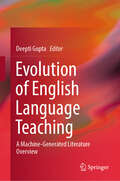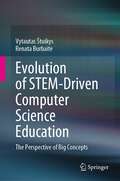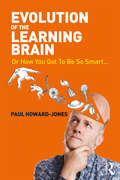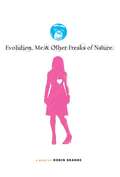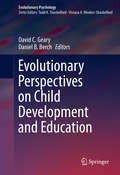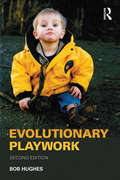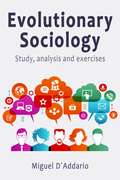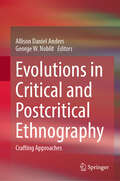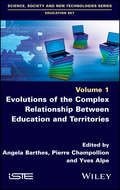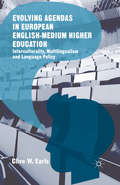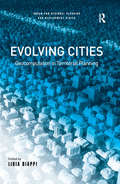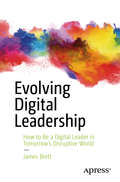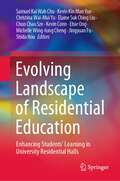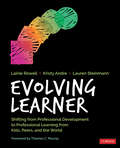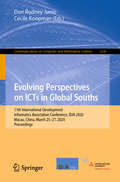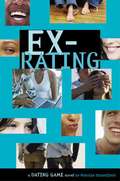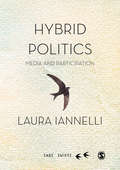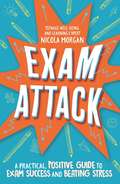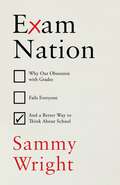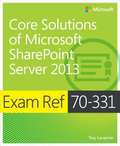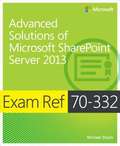- Table View
- List View
Evolution of English Language Teaching: A Machine-Generated Literature Overview
by Deepti GuptaThis book offers a machine-generated literature survey review of the vibrant history and multifaceted dimensions of English Language Teaching (ELT). It discusses its remarkable evolution and its profound impact across various fields. Its impact extends beyond education: influencing psychology, developmental studies, communication strategies for leaders and language proficiency assessment for migrants and job seekers. Each chapter is organized by the book editor along a chronological progression and begins with a human-written introduction. Each chapter chronicles a stage in ELT's growth, using publication dates as reference points and provides summaries of selected publications, offering readers the freedom to explore the various aspects of ELT. This reader-friendly volume accommodates diverse readers, including students, educators, researchers, policymakers and anyone intrigued by the intricate tapestry of English Language Teaching. It's a comprehensive journey through the evolution of ELT, reflecting its synchronous and diachronic dimensions, all within a single, accessible volume. The auto-summaries have been generated by a recursive clustering algorithm via the Dimensions Auto-summarizer by Digital Science. The editors of this book selected which Springer Nature content should be auto-summarized and decided its order of appearance. Please be aware that these are extractive auto-summaries, which consist of original sentences, but are not representative of the original paper, since we do not show the full length of the publication. Please note that only published SN content is represented here and that machine-generated books are still at an experimental stage.
Evolution of STEM-Driven Computer Science Education: The Perspective of Big Concepts
by Vytautas Štuikys Renata BurbaitėThe book discusses the evolution of STEM-driven Computer Science (CS) Education based on three categories of Big Concepts, Smart Education (Pedagogy), Technology (tools and adequate processes) and Content that relates to IoT, Data Science and AI. For developing, designing, testing, delivering and assessing learning outcomes for K-12 students (9-12 classes), the multi-dimensional modelling methodology is at the centre. The methodology covers conceptual and feature-based modelling, prototyping, and virtual and physical modelling at the implementation and usage level. Chapters contain case studies to assist understanding and learning. The book contains multiple methodological and scientific innovations including models, frameworks and approaches to drive STEM-driven CS education evolution.Educational strategists, educators, and researchers will find valuable material in this book to help them improve STEM-driven CS education strategies, curriculum development, and new ideas for research.
Evolution of the Learning Brain: Or How You Got To Be So Smart...
by Paul Howard-JonesHow does learning transform us biologically? What learning processes do we share with bacteria, jellyfish and monkeys? Is technology impacting on our evolution and what might the future hold for the learning brain? These are just some of the questions Paul Howard-Jones explores on a fascinating journey through 3.5 billion years of brain evolution, and discovers what it all means for how we learn today. Along the way, we discover how the E. coli in our stomachs learn to find food why a little nap can help bees find their way home the many ways that action, emotion and social interaction have shaped our ability to learn the central role of learning in our rise to top predator. An accessible writing style and numerous illustrations make Evolution of the Learning Brain an enthralling combination of biology, neuroscience and educational insight. Howard-Jones provides a fresh perspective on the nature of human learning that is exhaustively researched, exploring the implications of our most distant past for twenty-first-century education.
Evolution, Creationism, and the Battle to Control America'S Classrooms
by Michael Berkman Eric PlutzerWho should decide what children are taught in school? This question lies at the heart of the evolution-creation wars that have become a regular feature of the U. S. political landscape. Ever since the 1925 Scopes 'monkey trial' many have argued that the people should decide by majority rule and through political institutions; others variously point to the federal courts, educational experts, or scientists as the ideal arbiter. Berkman and Plutzer illuminate who really controls the nation's classrooms. Based on their innovative survey of 926 high school biology teachers they show that the real power lies with individual educators who make critical decisions in their own classrooms. Broad teacher discretion sometimes leads to excellent instruction in evolution. But the authors also find evidence of strong creationist tendencies in America's public high schools. More generally, they find evidence of a systematic undermining of science and the scientific method in many classrooms.
Evolution, Me & Other Freaks of Nature
by Robin BrandeYour best friend hates you. The guy you liked hates you. Your entire group of friends hates you.All because you did the right thing.Welcome to life for Mena, whose year is starting off in the worst way possible. She's been kicked out of her church group and no one will talk to her--not even her own parents. No one except for Casey, her supersmart lab partner in science class, who's pretty funny for the most brilliant guy on earth.And when Ms. Shepherd begins the unit on evolution, school becomes more dramatic than Mena could ever imagine . . . and her own life is about to evolve in some amazing and unexpected ways.From the Hardcover edition.
Evolution, Me and Other Freaks of Nature
by Robin BrandeFollowing her conscience led high school freshman Mena to clash with her parents and former friends from their conservative Christian church, but might result in new friendships and more when she stands up for a teacher who refuses to include "Intelligent Design" in lessons on evolution.
Evolutionary Perspectives on Child Development and Education
by David C. Geary Daniel B. BerchThis stimulating volume assembles leading scholars to address issuesin children's cognitive, academic, and social development through the lens ofevolutionary psychology. Debates and controversies in the field highlight thepotential value of this understanding, from basic early learning skills throughemerging social relationships in adolescence, with implications for academicoutcomes, curriculum development, and education policy. Children's evolvedtendency toward play and exploration fuels an extended discussion on child-versus adult-directed learning, evolutionary bases are examined for younglearners' moral development, and contemporary theories of learning and memoryare viewed from an evolutionary perspective. Alongthe way, contributors' recommendations illustrate real-world uses of evolution-basedlearning interventions during key developmental years. Among the topics covered: The adaptive value of cognitive immaturity:applications of evolutionary developmental psychology to early education Guidedplay: a solution to the play versus learning dichotomy Adolescent bullying in schools: anevolutionary perspective Fairness:what it isn't, what it is, and what it might be for Adaptingevolution education to a warming climate of teaching and learning The effects of an evolution-informed school environmenton student performance and wellbeing Evolutionary Perspectives on Child Development andEducation will interest researchers andgraduate students working in diverse areas such as evolutionary psychology,cultural anthropology, human ecology, developmental psychology, and educationalpsychology. Researchers in applied developmental science and early educationwill also find it useful.
Evolutionary Playwork
by Bob HughesPlay is a crucial component in the development of all children. In this fully updated and revised edition of his classic playwork text, Bob Hughes explores the complexities of children’s play, its meaning and purpose, and argues that adult-free play is essential for the psychological well-being of the child. The book is divided into fourteen chapters that together examine the fundamentals of evolutionary play. Firstly, Hughes examines the very earliest ideas of playwork and its impact on brain growth and organization today. He then goes on to explore and explain the key theoretical concepts underlying playwork. These include discussions on free play and creating suitable play environments alongside more thorny issues such as safety and consultation. Finally, the book offers up some of Hughes’ most recent research that reveals how his approach to play and playwork in global society has continued to evolve throughout his career to meet new challenges and needs. Throughout this book, Hughes has included his fellow practitioner Mick Conway’s vivid observations of children at play to bring the facts and arguments in the text to life. This revised edition reflects important recent advances in our understanding of the evolutionary history of play and its impact on the development of the brain, of the role play in the development of resilience and of the impact of play deprivation. Evolutionary Playwork is still the only book to combine the reality of playwork practice with the fundamentals of evolutionary and developmental psychology, and it is still essential reading for all playwork students, practitioners and researchers.
Evolutionary Sociology
by Miguel D'AddarioThe most basic idea that underlies the concept of structure is that reality is not chaos. The skeleton of a living being is its bony system. The structure of a building is given in the way beams, floors, spaces, etc. are arranged. One of the most important influences in shaping the concept of structure in the sociology comes from Marxist thought in which there has been a sharper structural image of society.
Evolutions in Critical and Postcritical Ethnography: Crafting Approaches
by George W. Noblit Allison Daniel AndersMoving beyond traditional critical ethnography, postcritical ethnographies accept as a key premise that studies which are critical of the social world must also turn critique back on the ethnographer, the study, and its process. The book includes an introduction to the evolutions of critical ethnography and postcritical ethnography and exemplar chapters from contributors who engaged in long-term ethnographic studies. Accompanying each chapter is an introductory preface and margin notes created by the editors to underscore the methodological ‘moves’ made by each author. Addressing the distinct orientations critical and postcritical ethnographies take, the book illuminates how different authors think, enact, and represent their critical and postcritical/post-critical work. In this way the book is pedagogical within and across each chapter. Each contributor has produced a chapter that includes a brief summary of their respective long-term inquiry project with emphases on relation in the being, doing, and theorizing of qualitative research. Contributors discuss their navigation of commitments across the arc of their research and engage critical social theory, interrogating issues of power and ideology. Each chapter includes retrospective analytical reflections on the long-term ethnographic work contributors completed. The chapters address interpretivist commitments to emic analyses, metaphor, and representation and each contributor’s personal and professional commitments to equity and justice. The chapters engage critical social theories, crip horizons, critical race theory, and queer theory, as well as critical and queer pedagogies, de/colonialism, and post-humanism. A summary chapter addresses key issues in contemporary postcritical/post-critical qualitative research. The book is designed to prepare novice qualitative researchers to craft, conduct, and represent postcritical/post-critical qualitative research. The book provides guidance for researchers who are interested in social critique, equity, and justice and who seek to avoid the failures in the last quarter of the 20th Century of critical ethnography.
Evolutions of the Complex Relationship Between Education and Territories
by Angela Barthes Pierre Champollion Yves AlpeThe book weaves the story of the complex links between education and its territories. The aim here is to examine the education couple - understood in the broadest sense: school, college, high school, universities - and territory, according to three main axes: the history and the characterization of the different ties maintained And which the school and its territory always maintain; That of the categorization and characterization of the territories in which the school is situated, of the educational policies - both explicit and grassroots - connected with it and their effects on the school; That of recent pedagogical, didactic and organizational innovations. The book is based on French specialists in territorial education issues.
Evolving Agendas in European English-Medium Higher Education: Interculturality, Multilingualism and Language Policy
by Clive W. EarlsEnglish medium-of-instruction (EMI) is transforming modern-day universities across the globe, creating increasingly complex linguistic and intercultural realities which lecturers, students and decision-makers must negotiate. Teaching subject matter at higher-education level through the medium of English, in countries where English is neither an official nor national language (e.g. the Netherlands, Germany), is a highly complex phenomenon fraught with challenges and benefits. EMI programmes are capable of transforming domestic degree programmes into platforms of intercultural teaching and learning by infusing them with greater numbers of international faculty and students. Equally however, EMI programmes pose a socio-linguistic, -cultural and -economic challenge by institutionalising English at higher-education level within a country and displacing somewhat national and minority languages. This book, the first of its kind, provides an up-to-date and empirically-informed exploration of these salient themes in Europe, based on significant empirical data gathered and analysed on the German EMI context.
Evolving Cities: Geocomputation in Territorial Planning (Urban and Regional Planning and Development Series)
by Lidia DiappiGeocomputation has come of age. The whirlwind of change experienced in Geographical Information Science (GIS) - developments in IT, and new data gathering and earth observing technologies - has taken GIS beyond mere data and towards its analysis, modeling, and use in problem solving. Geocomputation is now at the dynamic edge of this revolution. Bringing together the leading researchers in geocomputation, this volume provides an up-to-date overview of the development of new artificial intelligence principles and technologies (NN, CA, Multi-agent Systems and Evolutionary Algorithms) used for the analysis, development and evaluation of urban planning policies and programmes. Charting the new approaches to data-processing, the book provides pointers on how to harness these technologies, advancing the knowledge level of planning by multiplying the information capacity of GIS, and offering a new approach to territorial modeling and micro-scale descriptions of socio-economic, behavioural and micro-spatial theories of urban processes and land use change.
Evolving Digital Leadership: How to Be a Digital Leader in Tomorrow’s Disruptive World
by James BrettGet ready to be an effective digital leader, influencer, disruptor, and catalyst for change in the digital world!As a leader you need to constantly evolve to achieve sustained success. The world is being transformed by Digital. The pace of change is constantly accelerating and volatility and complexity are the new norms. Digital leaders are at the forefront of these waves of change, creating new markets and transforming traditional ones.This book is a framework and set of tools that will help you develop a deep awareness of yourself, your teams, and your stakeholders. The powerful four-step process (designed to remain relevant over time) ensures that you are embracing adversity, driving disruption, and unlocking your full leadership potential.What You'll LearnBe an influencer, disrupter, and catalyst for change in a disruptive worldKnow five key career recommendations from 40 digital leaders with more than 400 years of combined experienceUse the four steps of the Unnatural Selection framework to facilitate your personal evolution and digital leadership successDemystify what makes people tick using the Human Full Stack, which is a model analogous to the technical full stack, so that complex behaviors are easier to understandEmbody intentionality to avoid distractions and achieve what’s important—your personal evolution, growing amazing teams, and influencing stakeholdersWho This Book Is ForLeaders who come from a technical background or are leading technical teams/organizations and want to be a part of building tomorrow's digital world
Evolving Landscape of Residential Education: Enhancing Students’ Learning in University Residential Halls
by Samuel Kai Wah Chu Elsie Ong Kevin Kin Man Yue Christina Wai-Mui Yu Elaine Suk Ching Liu Chun Chau Sze Kevin Conn Michelle Wing-tung Cheng Jingyuan Fu Shida HouThis book examines the alignment of residential educational aims and university educational aims in order to provide guidance for implementing university-specific residential educational aims. Grounded in a new theoretical model of residential education, Residential Education in university probes into how university students adopt transformative learning through residential halls in different universities. By reviewing case studies, experience sharing, and residential hall models in renowned universities in Asia, U.K., and USA respectively, this book offers a wide perspective to assess different residential education models in practice and useful programs to promote students learning outcomes. The detailed discussion on how to create learning environments and align educational aims of residence and university to maximize learning outcomes in different cultural contexts provides readers with insight into how the residential experience in university can be improved.
Evolving Learner: Shifting From Professional Development to Professional Learning From Kids, Peers, and the World
by Lainie Jae Rowell Kristy J. Andre Lauren SteinmannLearn from Kids, Peers, and the World to Transform Professional Learning What can kids teach us about educational practices? It turns out, plenty. PD is evolving into professional learning (PL), where personalized experiences focus on goals and outcomes, rather than seat time. In Evolving Learner, successful PL is framed through three critical sources: learning from kids, from peers, and from the world. Woven throughout the book are tangible connections to cycles of inquiry where a harmonious balance is the ultimate goal when students are engaged in inquiry for deeper learning and teachers are engaged in a parallel process to improve their practice. The authors’ unique framework shifts away from factory model "PD" and transforms it into experiences tailored to kids’ and adult learners’ specific needs. Clear strategies for accomplishing PL are presented through A framework where both students and teachers are active agents of learning Cycles of inquiry to empower students to become the owners of learning Techniques to make thinking visible for teachers and students Cutting edge coverage of applying technology to professional learning including the use of social media, gamification, and digital badges The time is right to reclaim ownership of your professional learning: Evolving Learner is an essential guide for embarking on this journey.
Evolving Learner: Shifting From Professional Development to Professional Learning From Kids, Peers, and the World
by Lainie Jae Rowell Kristy J. Andre Lauren SteinmannLearn from Kids, Peers, and the World to Transform Professional Learning What can kids teach us about educational practices? It turns out, plenty. PD is evolving into professional learning (PL), where personalized experiences focus on goals and outcomes, rather than seat time. In Evolving Learner, successful PL is framed through three critical sources: learning from kids, from peers, and from the world. Woven throughout the book are tangible connections to cycles of inquiry where a harmonious balance is the ultimate goal when students are engaged in inquiry for deeper learning and teachers are engaged in a parallel process to improve their practice. The authors’ unique framework shifts away from factory model "PD" and transforms it into experiences tailored to kids’ and adult learners’ specific needs. Clear strategies for accomplishing PL are presented through A framework where both students and teachers are active agents of learning Cycles of inquiry to empower students to become the owners of learning Techniques to make thinking visible for teachers and students Cutting edge coverage of applying technology to professional learning including the use of social media, gamification, and digital badges The time is right to reclaim ownership of your professional learning: Evolving Learner is an essential guide for embarking on this journey.
Evolving Perspectives on ICTs in Global Souths: 11th International Development Informatics Association Conference, IDIA 2020, Macau, China, March 25–27, 2020, Proceedings (Communications in Computer and Information Science #1236)
by Don Rodney Junio Cecile KoopmanThis book constitutes the refereed proceedings of the 11th International Development Informatics Association Conference, IDIA 2020, held in Macau, China, in March 2020.*The 14 revised full papers presented were carefully reviewed and selected from 43 submissions. The papers are organized in topical sections on ICT4D: taking stock; harnessing frontier technologies for sustainable development; ICT4D discourse, methodologies, and theoretical reflections; the evolving Global Souths.*The conference was held virtually due to the COVID-19 pandemic.
Ex-Rating
by Natalie StandifordBest friends, Madison, Lina, and Holly created The Dating Game as a way to get credit for their Interpersonal Human Dynamics course (a fancy name for Sex Ed). Now they've become sought-after online matchmakers for their whole school!
Exaggerated Claims?: The ESRC, 50 Years On (SAGE Swifts)
by David Walker"David Walker’s analysis is incisive and hard hitting. Anyone who believes in the power of social science to inform better policy making should take his criticisms seriously." - Sue Duncan, Former Chief Government Social Researcher and Head of the Government Social Research Service "David Walker has written an unofficial summary of ESRC's achievements and struggles. He brings to the task long experience of the organisation and of the key players, a great familiarity with the literature and a sceptical nature. The result is stimulating, instructive, contentious and sometimes even infuriating." - David Rhind, Chair of the Nuffield Foundation What is the role of the state in distributing research money? How do 'arm's-length' funding agencies relate to public policy and business? This original study looks at the main social science funding agency in the UK, which was established 50 years ago. It examines how funding decisions are related to power. The 'critical' and ‘policy' aspects of successful research bids are discussed. Walker asks the tricky question, why has social science research not achieved a more salient role in state policy formation and management strategy: is the funding agency responsible? Insightful, engrossing and highly original, the book will be required reading for anyone who has written or will write a Social Science research bid and, more widely, for students of power, knowledge and culture.
Exam Attack
by Nicola MorganA practical, positive, utterly sensible guide for exam students, for the best chance of success.Exams are stressful and most people don't love them! This book can't remove all your exam nerves and, anyway, a certain level of stress can help you perform well. Instead this book aims to help you avoid bad stress and have the greatest chance of doing your best when exams arrive. It will give you the tools to control your body and mind during this challenging phase. And the tools will help you at many other stressful times of life.Exam Attack covers a huge range of learning techniques. You'll find advice on food (and how to cope when you lose your appetite), sleep, panic, revision, getting help, managing screens and social media. And there's up-to-date advice on note-taking and learning.One of the core principles in this book is that our mental and physical health, or 'wellbeing', affects how we perform. It isn't a luxury or optional extra: it affects every aspect of life. Rest, relaxation and taking time-out from revision can actually help you to learn and perform more effectively.The sensible, achievable suggestions throughout include current advice on revision techniques; positive attitudes to work and achieving the right mindset; self-belief and self-esteem; dealing with distractions and procrastination, such as how to push yourself when you're really not feeling up to it; and how to let go of your phone and regulate social media use.There's no doubt that exams are stressful, but with this comprehensive guide, you will have all the tools you need to achieve and succeed.
Exam Material (CBCS) First Semester B.A. - Bangalore University: ಪರೀಕ್ಷಾ ಸಾಹಿತ್ಯ (ಸಿಬಿಸಿಎಸ್) ಪ್ರಥಮ ಸೆಮಿಸ್ಟರ್ ಬಿ.ಎ. - ಬೆಂಗಳೂರು ವಿಶ್ವವಿದ್ಯಾಲಯ
by Evershine Publicationsಈ ಪುಸ್ತಕ ಎವರ್ಶೈನ್ 2019 EDITION 1ನೇ ಸೆಮಿಸ್ಟರ್ ಬಿ.ಎ. ಪ್ರಶ್ನೆಗಳ ಸಂಗ್ರಹ. ಈ ಪುಸ್ತಕದಲ್ಲಿ ಇತಿಹಾಸ,ಅರ್ಥಶಾಸ್ತ್ರ,ರಾಜ್ಯಶಾಸ್ತ್ರ,ಸಮಾಜಶಾಸ್ತ್ರ ಮತ್ತು ಪರಿಸರ ಅಧ್ಯಯನ ವಿಷಯಗಳು ಇವೆ.ಇದು ಹೊಸ ಪಠ್ಯಕ್ರಮ ಬೆಂಗಳೂರು ವಿಶ್ವವಿದ್ಯಾಲಯ ನಿಯಮಗಳನ್ನು ಅನುಸರಿಸಲಾಗುತ್ತದೆ.
Exam Nation: Why Our Obsession with Grades Fails Everyone – and a Better Way to Think About School
by Sammy WrightExams, grades, league tables, Ofsted reports. All of them miss the point of school and together they are undermining our whole approach to education.'An essential read – as entertaining as it is insightful – for anyone who cares about the way we treat young people' ObserverWhat is school for? Drawing on his twenty years as a teacher, hundreds of interviews and his experience on the UK Government's Social Mobility Commission, head teacher Sammy Wright exposes the fundamental misconception at the heart of our education system. By focusing on the grades pupils get in neatly siloed, academic subjects, we end up ranking them and our schools into winners and losers: some pupils are set on a trajectory to university - the rest are left ill-equipped for the world they actually face.Wright's entertaining and hugely important book shows that schools are - and should be - so much more than this. With wisdom and humour, balancing idealism and pragmatism, he sets out what a better way would look like and how we might get there.‘Brilliantly illuminates the realities and blindspots of the system’ Jeffrey Boakye ‘Deeply absorbing...Wright deserves the highest marks’ Financial Times'Such a compelling read, no matter your outlook' Telegraph‘Extraordinary and brilliant . . . the book education has been waiting for’ Laura McInerney, co-founder of Teacher Tapp
Exam Ref 70-331: Core Solutions of Microsoft SharePoint Server 2013
by Troy LanphierPrepare for Exam 70-331--and help demonstrate your real-world mastery of Microsoft SharePoint Server 2013 core solutions. Designed for experienced IT professionals ready to advance their status, Exam Ref focuses on the critical-thinking and decision-making acumen needed for success at the MCSE level. Focus on the expertise measured by these objectives: Design a SharePoint Topology Plan Security Install and Configure SharePoint Farms Create and Configure Web Applications and Site Collections Maintain a Core SharePoint Environment This Microsoft Exam Ref: Organizes its coverage by exam objectives. Features strategic, what-if scenarios to challenge you. Includes a 15% exam discount from Microsoft. Offer expires 12/31/2017.
Exam Ref 70-332: Advanced Solutions of Microsoft SharePoint Server 2013
by Michael DoylePrepare for Exam 70-332--and help demonstrate your real-world mastery of Microsoft SharePoint Server 2013. Designed for experienced IT Professionals ready to advance their status, Exam Ref focuses on the critical-thinking and decision-making acumen needed for success at the MCSE level. Focus on the expertise measured by these objectives: Plan Business Continuity Management Plan a SharePoint Environment Upgrade and Migrate a SharePoint Environment Create and Configure Service Applications Manage SharePoint Solutions, BI, and Systems Integration
